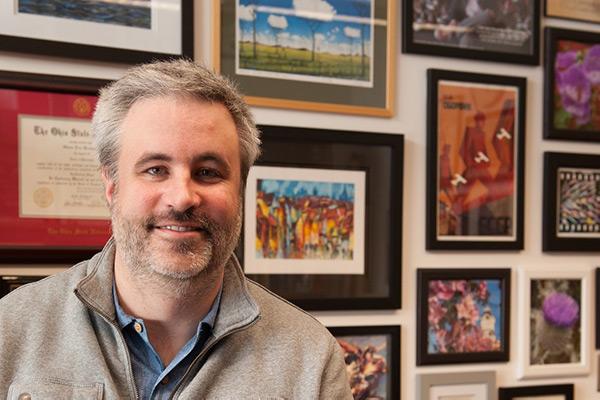April 2021 CSEEES FLAS Alumni Profile: Glenn Kranking

Glenn Kranking, PhD in History, Class of 2009
Summer 2005 FLAS Fellowship Recipient for Intermediate Russian
Where do you work and what is your current position?
I am Associate Professor of History and Scandinavian Studies at Gustavus Adolphus College in St. Peter, Minnesota. I am also currently the Director of the Russian and East European Studies Program.
Tell us how you got there.
I was hired by Gustavus as I was completing my PhD in 2009. My position at Gustavus was focused initially on Scandinavian history, although my background in Russian history meant I could take over Russian history courses when the Russian historian retired two years later.
How has your CSEES FLAS helped you throughout your post-graduate life?
While the majority of my research is in Swedish and Estonian, a number of sources are in Russian. I spent a couple of weeks researching at archives in Moscow, and my language and cultural experiences from my time in St. Petersburg with the FLAS were invaluable in that process. Although I am not teaching the Russian language, I have been part of the search committee hiring process for Russian-language faculty, and currently advise all of the students in the Russian and East European Studies program.
What was your focus or research interest when you studied at OSU?
My research for the History PhD focused on the Swedish minority population in Estonia, looking at the population in the Russian Empire, independent Estonian period during the Interwar years, first Soviet occupation (1940-1941), and the Nazi occupation (1941-1944) when the majority of the population fled to Sweden. Prior to entering OSU, I had studied in Estonia for 3 years, with extensive archival research. While doing my doctoral research, I spent the majority of the time based in Stockholm (hosted by the Baltic and East European Graduate School at Södertörn University), with shorter research trips to Estonia and Moscow.
If you are a traveler, what is one of your favorite trips you have taken?
I have had the pleasure of being an expert and lecturer on summer tours with Smithsonian Journeys (a travel program organized through the Smithsonian). One of my favorite trips is their Baltic Sea cruise, as it connects to places I have lived and researched all around the Baltic Sea - and including a few days in St. Petersburg. It is great to return, even in a capacity as a tourist, and to see the city through the eyes of the other tourists that are experiencing Russian culture for the first time. But one of my favorite trips was a long weekend I spent in Moscow during the time I had the FLAS grant. It was a chance to explore the city on my own, waiting in line for what would be a surreal experience in Lenin's mausoleum, and discovering interesting parks and museums.
What are your future plans?
I am still working on a book project about the Swedish minority population of Estonia, specifically focused on the Second World War occupations and their repatriation to Sweden. One of my next projects, which I have already started, will look at Swedes traveling through the Russian Empire in the 19th century, contrasting their views of Russia as an exotic land of opportunities and adventure with the Swedish state's view of Russia as a potential threat/enemy.
If you work in academia, what advice would you give to current and prospective PhD students?
Consider the many opportunities Ohio State offers students, and find ways to compliment your work, but also expand your horizons. If you plan to go into academia, what will make you stand out from others? Consider the paths less traveled, the topics sometimes overlooked. But also keep in mind, your position may require you to teach the bigger picture, too. If you bring excitement to a topic, that energy will hopefully come through in the interview process and teaching demonstration, and eventually attract students to your courses. I also took part in the Preparing Future Faculty Program offered at OSU, which was a training and mentorship program for those interested in careers at smaller colleges and liberal arts institutions, which was invaluable for me when I was on the job market. Unfortunately, it seems like many places are reducing offerings of Russian language, so a big part of our jobs is recruiting students to our courses, getting them to see the value of studying Russia - the global implications of the Russian state - as we face the challenges of our time. And a good portion of our time is also making that argument to administrators. How will you make the argument for why it is important to study Russian?
